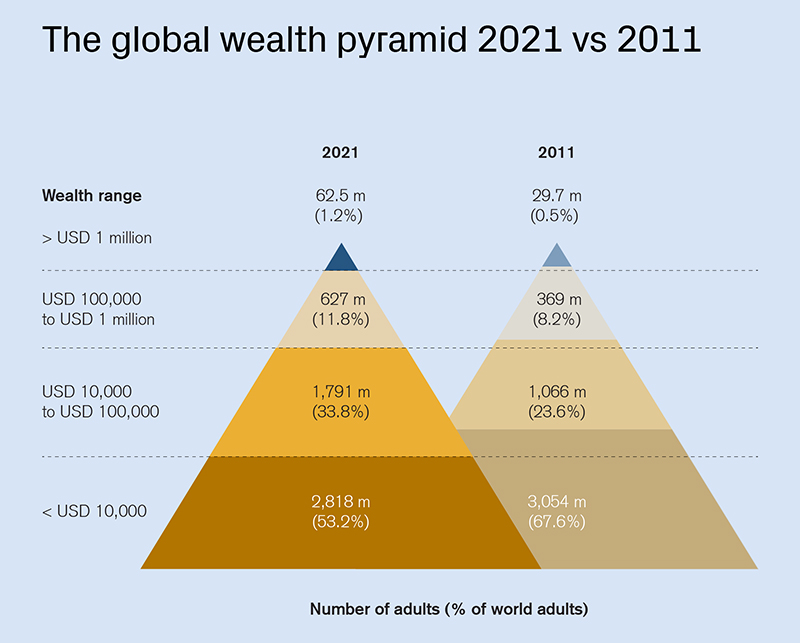Volcanoes are erupting in The Philippines, but on-fire Australia received some welcome rain. The Iran war cries have been called off and The Donald’s military powers are about to be hamstrung by the Senate. Meanwhile, his impeachment trial is starting, and we’re all on Twitter for a front-row seat.
What Could Go Right? Winds of freedom
We talk protests in Iran, the election in Italy, and the world getting richer
This is our weekly newsletter, What Could Go Right? Sign up here to receive it in your inbox every Thursday at 6am ET. You can read past issues here.
David v. Goliath in Iran and Ukraine
Iranians are revolting against their government’s repressive regime following the death of 22-year-old Mahsa Amini while under custody of the morality police. (Summary here if you haven’t been following the story—we sometimes choose to save space in this newsletter if we are covering mainstream news.) A hopeful theme we’ve seen repeated recently: Iranians are swimming in new waters.
“In 1979, when women were demonstrating against the threat of hijab, they were alone,” writer Roya Hakakian told Bret Stephens for his New York Times column on the women-led protests in Iran and Russia. Now they have Iranian men on their side—and all of TikTok, Twitter, and Instagram.
“This is really a women’s movement being supported by men and social media, something we’ve never seen before in this country,” said NBC News Tehran Bureau Chief Ali Arouzi on MSNBC. The protestors, continued Hakakian, are “counter[ing] the regime’s misogyny with unprecedented egalitarianism.”

And unprecedented eyeballs. Personally, I saw the videos of women burning their hijabs going viral on TikTok at least a couple of days before I saw any official news coverage. There are plenty of takes out there about how constant, direct access to difficult imagery on social media can lead to compassion fatigue or news burnout. It’s true, for instance, that Ukraine has gone in and out of the news cycle in the last months as attention waxes and wanes. But social media does help grip the world in a way that means related dominoes seem to fall more quickly. All of us have been watching Ukraine, Iran most likely included.
Chess champion and chairman of the Human Rights Foundation Garry Kasparov tied this thought together neatly on Twitter: “The winds of freedom are drifting across the globe. Iran, Dagestan, people are inspired directly and indirectly. If Ukraine can defeat Putin, dictators aren’t invincible.” Can Iranians break free, too?
The return of Italian fascism? Not so fast
Speaking of social media, this video of a speech from Italian future prime minister Giorgia Meloni, elected on Sunday, has gone viral. Media has been quick to tie her party’s fascist roots into coverage. It’s easy to jump to the conclusion that Italy has started to backslide into fascism.
In The Atlantic, The Progress Network (TPN) Member Yascha Mounk posits that Meloni’s victory “has less to do with nostalgia for Italy’s fascist past than with anger at the country’s parlous present,” rocked as the country has been by the pandemic, and now, inflation. Meloni is constrained by economic realities, pro-Ukraine, and not in a hurry to pick a fight with the European Union, says GZERO Media.
As Mounk writes, then, “The most immediate concern about Italy’s new government is not any threat to the country’s democratic institutions, still less a return to fascism. Rather, it is what the electoral dominance of the far right will do to the hard-won progress that immigrants and sexual minorities in Italy have made over recent decades.”
Which is a long way of saying, things aren’t good, but they’re not as bad as Mussolini, Part Two. Political views aside, we’ll still give her the kudos for being set to become Italy’s first female prime minister. (This TikTok guy gots the jokes on that.)
Started from the bottom, now we here
Credit Suisse just released their 2022 Global Wealth Report, and the world is getting richer, baby! In 2021, global wealth grew at the fastest annual rate ever recorded, 12.7 percent. When adjusted for inflation the rate falls to just over 8 percent. If you’re sitting there thinking, “bah, the rich getting richer,” you are both correct and incorrect. The big bullets from the report:
- Global wealth inequality has fallen this century because emerging economies are growing faster.
- Over the last two decades, the average household has been able to build up wealth.
- 2021 was a particularly weird year due to irregular, high government spending to mitigate the pandemic’s economic shocks. So while growth will likely slow in the future—especially given potential recession in 2022 or 2023—Credit Suisse expects it to keep going over a five-year frame.
- North America and China together account for around 75 percent of global wealth growth; Africa, Europe, India, and Latin America grew, too, but together only accounted for 11.1 percent.

Looking at mean wealth per adult, Switzerland, the United States, and Hong Kong are the richest countries, but this result is skewed by the massive wealth of high net worth individuals. A better picture of overall wealth is a country’s median wealth per adult, which drops the US to 18th place. Australia, Belgium, and New Zealand then take the top three spots.
It has been very common to read in the US that during the pandemic the wealthy got wealthier. That is true, but the report also had what it calls an “unexpected” finding: in the US, the bottom 50 percent of households got wealthier, too. As for percentiles 51–99, wealth was redistributed away from them to the top 1 and bottom 50 percent. You can form your own opinion of whether, as the report says, “wealth improvements at the bottom of the distribution offset gains at the top.”
Going the way of the dinosaurs? As if
The odds are low we’d be the recipients of an Earth-smashing asteroid—higher for one that “just” takes out a city—but we may be able to knock the risk entirely off the list soon. This week the National Aeronautics and Space Administration (NASA) successfully smashed a spacecraft into Didimos, a poor rock minding its own business in the middle of space. (Didimos’ point of view.) As this National Geographic article explains, it “marks the first time humans have intentionally changed the course of a celestial object.”

The video makes it looks like the spacecraft blew Didimos to smithereens, but it actually just knocked it slightly off course. In the coming years, NASA will track its new orbit and survey the aftermath, aka all that rock detritus floating around, so that we would one day be prepared to divert any dangerous asteroids heading our way.
Before we go
Kim Kardashian thinks that no one wants to work anymore. “This kind of rhetoric,” tweeted LinkedIn’s principal economist Guy Berger, is “very disconnected from reality. The share of prime-working-age Americans with a job is well above its 25-year average.” (Chart here.) And we really enjoyed this Financial Times article about the entrepreneurial teens of TikTok building businesses “IRL”—it’s far more wholesome of a story than you might expect. Also, it’s nice to hear that US manufacturing jobs are back above pre-pandemic levels.
Two other bits of progress news around the world: Cubans have voted to approve same-sex marriage. Nigeria is chipping away at their Sustainable Development Goals, registering a drop in child marriages, from 44 percent of children in 2016 to 30 percent in 2021.
And, this article on including gun owners in the gun regulation debate, and the organizations actually doing it, was well worth the read.
Below in the links section, “Isodope” breaks down the advantages of nuclear power, researchers develop a technique to spot deepfake audio, and more.
Progress Pop Quiz
Last week’s question: of the 100 most populous US cities, can you name one of the five where rents decreased the most month-over-month, according to data from August?
Tough question indeed, as no one answered correctly. The top five were Des Moines, Iowa; Anchorage, Alaska; Chicago, Illinois; Irving, Texas; and Plano, Texas.
Legalizing Marijuana, Electric Cars, and What’s Going on with California?

This week on the What Could Go Right? podcast: How has the experiment to legalize marijuana gone? Do schoolchildren need more sleep? Why is California suddenly doing all the things? Plus, bans to usher in a future of electric cars, bail reform, and tackling homelessness with Senate Majority Leader Emeritus Robert Hertzberg. | Listen to the episode
Progress, Please
(Found good news? Tweet at us @progressntwrk or email.)
Other good stuff in the news 🐋
Environment:
- The robot solving America’s trash crisis | Freethink
- Wild mammals are making a comeback in Europe thanks to conservation efforts | Our World in Data
- Bolivia’s ‘Death Road’ once haunted drivers. Now it’s a wildlife haven. | Reuters
- Sea turtles swim easier as poaching declines | Nature
- Nuclear power is our best hope to ditch fossil fuels | TED
- What will it take to recycle millions of worn-out EV batteries? | Knowable Magazine
- Electric planes are taking flight | Smithsonian Magazine
Science & Tech:
- Deepfake audio has a tell and researchers can spot it | Ars Technica
- Math could help crack forensic genetic cases 10x faster | Futurity
- Saving whales from ship collisions with warnings and letter grades | The New York Times
- The new Roomba can vacuum and mop—without getting water on your carpet | CNET
Politics & Policy:
- Brussels breaks up with the car | Politico
- Prioritizing pedestrians: How a Spanish city was named one of the best places to live | Euronews
- US announces over $170M in humanitarian assistance for Rohingya Muslims | Reuters
- ‘The kids are just happier’: could California’s universal school meal program start a trend? | The Guardian
- All 50 states greenlit to move EV charging networks forward | US Department of Transportation
- US Senate ratifies pact to curb potent greenhouse gases | The New York Times
- Phoenix plans to build affordable housing on vacant city land | Axios
- Japan bans chemical weapons-related goods to Russia | Reuters
Public Health:
- Meth addiction treatments are finally on the horizon | Freethink
- Cancer death rates fall steadily in the US, with more survivors than ever | CNN
- WHO’s Africa hub starts work on mRNA tuberculosis vaccine | Bloomberg
- Japan’s $2-billion initiative to prep pandemic vaccines in 100 days | Nature
- India develops its first cervical cancer vaccine | Reuters
- Malawi claims victory over trachoma | VOA
- How Singapore builds its dementia-friendly neighborhoods | The Straits Times
Economy:
- Hertz is teaming up with oil giant BP to install thousands of EV chargers in the US | CNBC
- EV market share in Southeast US doubles as industry brings almost $33 billion to the region | Electrek
- Samsung sets goal to attain 100% clean energy by 2050 | AP
- Rents drop for first time in two years after climbing to records | The Wall Street Journal
- Lumber prices fall back to around their pre-Covid levels | The Wall Street Journal
- US consumers gaining confidence as gas prices keep falling | AP
TPN Member originals 🧠
(Who are our Members? Get to know them.)
- The other scandal revealed at Mar-a-Lago | Zachary Karabell
- Big Tech founders are America’s false idols | Scott Galloway
- How to be less self-centered | Arthur C. Brooks
- The Black silent majority | Theodore R. Johnson
- What progressives misunderstand about fighting climate change | Alec Stapp
- The EU is finally standing up to Viktor Orbán | Ian Bremmer
- Stop making Asian Americans pay the price for campus diversity | John McWhorter
- Richard Reeves on why men are struggling | Yascha Mounk
- A new book on the recent past sheds light on the immediate future | James Fallows
- How do you handle a wounded Putin? | David Brooks
- Russia’s military and economic strategy is failing | Matthew Yglesias
- Russia will snap | Diane Francis
- Futurist Ari Wallach on overcoming the reactionary, short-term thinking that pervades today’s society | Andrew Yang
- The return of fascism in Italy | Ruth Ben-Ghiat
- Imagining a better future is easy if you try. But you have to try. | James Pethokoukis
- Non-member add: How we build the future | Kevin Kelly
Department of Ideas 💡
(A staff recommendation guaranteed to give your brain some food for thought.)
The danger of politicizing science | Persuasion
Truth and justice are best served by more rigor, not less.
Why we picked it: Not all well-intentioned ideas are good ones. Where progress is the goal, bad ideas should be met with respectful criticism and better ideas. “Should academic journals appoint themselves social justice gatekeepers?” I vote no. —Brian Leli
Upcoming Events
- A Time of Perspective: Revolutionary Love | Valarie Kaur | October 1
- Restitching the Fabric of Our Democracy | Eboo Patel & Manu Meel | October 6
Until Next Time
Imagine there’s no GPT-3. It isn’t hard to do. 😉👇


